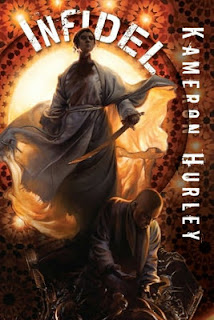 and trying not to die spectacularly. Along the way, she justified her nomadic lifestyle by picking up degrees in history from the University of Alaska and the University of Kwa-Zulu Natal.
and trying not to die spectacularly. Along the way, she justified her nomadic lifestyle by picking up degrees in history from the University of Alaska and the University of Kwa-Zulu Natal.Hurley's novels include God’s War and Infidel.
A couple of weeks ago I asked her what she was reading. Her reply:
A good deal of my nonfiction reading involves tales of war and tactics, logistics and the psychology of killing. You would think I’d take a break from this when I read fiction, but because I’m fascinated with the exploration of war, terror, fear, and violence and how the way we divide, oppress and categorize people plays into that, I am just as interested in how other fiction writers explore these topics.Visit Kameron Hurley's website.
Just this week, I finished reading Stories from the New War by Joel Best. It’s a book of prose poetry that explores the stories of the people and places being transformed by a long, drawn-out conflict. One of the truths you uncover as you delve into the history of war is that often, who the enemy is andwhat people are fighting over isn’t as relevant to the personal stories of those affected by the conflict as you might think.
Most people are unwilling or unconscious participants in wars – we work in factories, write communications, make sure the trains run on time – but each of our actions is necessary for the continuation of the conflict that is slowly killing us. And it is in showing the everyday lives of these people that Best excels. This wasn’t about the soldiers on the field, or the people making decisions from on high. It was an exploration of how our everyday lives are changed and shaped by ongoing hardship.
For me, the strength of this book was in how well it evoked the many protagonists’ feelings of both helplessness and grim determination in the face of war. They reminded me of stories my grandmother told me of occupied France during WWII. The details of everyday life – from unending quotas for seemingly innocuous goods, to dealing with mad neighbors and non-paying clientele at a local restaurant – were vivid , heartbreaking… and highly recommended.
My Book, The Movie: God’s War and Infidel.
--Marshal Zeringue




